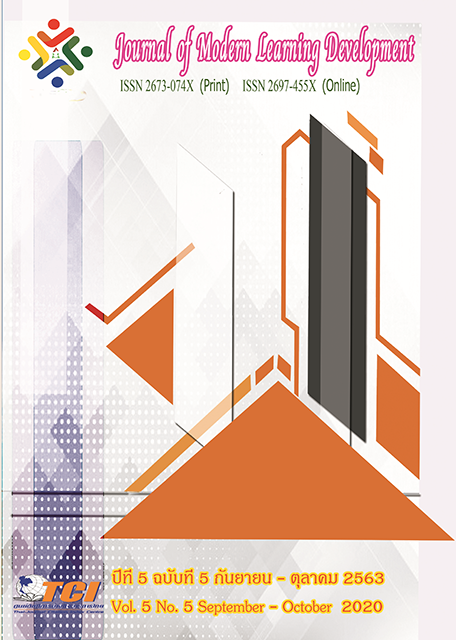Applying web-based Instruction to efl for Undergraduate Students to Improve The English Language Ablity Based on The reference levels of The common european Framework of reference for languages
Main Article Content
Abstract
The objectives of the research were to evaluate application of Web-based instruction (WBI) to English learning, and to recognize and develop the students’ attitudes on English learning. The population of the research was a total of undergraduate students, Mahamakut Buddhist University Roi-Et Campus; the samples of 135 students voluntary to participate in the research and to have the Oxford Test in reference to the Common European Framework of Reference for Languages (CEFR) were purposively selected. The instruments of the research were comprised of
1) the Oxford Test results under the CEFR-based English Skill Development Project, 2) Assessment of CEFR-based WBI Model, 3) Content Assessment of CEFR-based WBI Model, 4) Online Classroom Assessment of CEFR-based WBI Model, 5) Survey of Students’ English Learning Attitudes, and 6) CEFR English Test after WBI Learning. The statistics used for data analysis consisted of percentage, mean and standard deviation. The findings of the research were as follows: (1) The evaluation of application of WBI English learning was found that the students’ CEFR English proficiency was found to be higher; the majority of the students were equipped with at least the A1 level and higher. (2) The students’ recognition and development of good attitudes on Enlish learning was found to be at a high level.
Article Details
References
กระทรวงศึกษาธิการ. (2560). มาตรฐานคุณวุฒิระดับปริญญาตรี สาขาวิชาภาษาอังกฤษ พ.ศ. 2560. เอกสารแนบท้าย ประกาศกระทรวงศึกษาธิการ เรื่อง มาตรฐานคุณวุฒิระดับปริญญาตรี สาขาวิชาภาษาอังกฤษ พ.ศ. 2560. ออนไลน์. สืบค้นเมื่อ 1 พฤษภาคม 2560. แหล่งที่มา : http://www.mua.go.th/users/tqf-hed/news/data6/Bachelor%20in%20English_m1.pdf
นิลุบล ทองชัย. (2558). การประยุกต์ใช้สื่อการเรียนออนไลน์เพื่อเพิ่มผลสัมฤทธิ์ในการเรียนรายวิชาภาษา อังกฤษสำหรับวิทยาการคอมพิวเตอร์ของนักศึกษามหาวิทยาลัยราชภัฏกาญจนบุรีสาขาวิทยาการคอมพิวเตอร์คณะวิทยาศาสตร์และเทคโนโลยี.ออนไลน์.สืบค้นเมื่อ 31 ธันวาคม2560.แหล่งที่มา: http://202.44.34.144/nccitedoc/admin/nccit_files/NCCIT-20150810153241.pdf
ภัทธิรา ธีรสวัสดิ์. (2556). การพัฒนาสื่อบทเรียนอิเล็กทรอนิกส์: การจัดการการสื่อสาร. กรุงเทพมหานคร:วิทยาลัยนวัตกรรมสื่อสารสังคม มหาวิทยาลัยศรีนครินทรวิโรฒ.
ยอดนภา เกษเมือง. (2554). การพัฒนาระบบการเรียนการสอนบนเว็บไซต์เพื่อเพิ่มผลสัมฤทธิ์ทางการเรียนของนักศึกษา. วิทยานิพนธ์ปริญญาวิศวกรรมศาสตร์มหาบัณฑิต. สาขาวิชาวิศวกรรมอุตสาหการ ปทุมธานี: คณะวิศวกรรมศาสตร์ มหาวิทยาลัยเทคโนโลยีราชมงคลธัญบุรี.
สุรพล บุญลือ. (2550). การพัฒนารูปแบบการสอนโดยใช้ห้องเรียนเสมือนจริงแบบใช้ปัญหาเป็นหลักในระดับ อุดมศึกษา. วิทยานิพนธ์ปริญญาการศึกษาดุษฏีบัณฑิต. สาขาวิชาเทคโนโลยีการศึกษา. กรุงเทพมหานคร: มหาวิทยาลัยศรีนครินทรวิโรฒ.
อัญชลี บุญฤทธิ์. (2554). ศึกษาผลสัมฤทธิ์ทางการเรียนของผู้เรียนโดยใช้ห้องเรียนเสมือนจริง. วิทยานิพนธ์ปริญญาครุศาสตร์อุตสาหกรรมมหาบัณฑิต. สาขาวิชาคอมพิวเตอร์และเทคโนโลยีสารสนเทศ กรุงเทพมหานคร: คณะครุศาสตร์อุตสาหกรรมและเทคโนโลยี มหาวิทยาลัย เทคโนโลยีพระจอมเกล้าธนบุรี.
อัมรินทร์ทีวี (2560). ผลสำรวจเผย! ภาษาอังกฤษของคนไทย อยู่อันดับ 53 จาก 80 ประเทศทั่วโลก. ออนไลน์. สืบค้นเมื่อ 1 พฤษภาคม 2560. แหล่งที่มา: https://www.amarintv.com/news-update/news-4411/109832/
Council of Europe. (2001). Common European Framework of Reference for Languages. Learning, Teaching, Assessment (CEFR). Online. Retrived May 12, 2016.from :http://www.coe.int/t/dg4/linguistic/Source/Framework_EN.pdf.
Shih Ching Chum. (1998). Relationship among Student Attitudes Motivation Learning Style Strategies Patterns of Learning and Achievement: A Formative Evaluation of Distance Education VIA WEB-BASED Courses. Online. Retrived May 12, 2016 from: http://www7.ewebcity.com.


